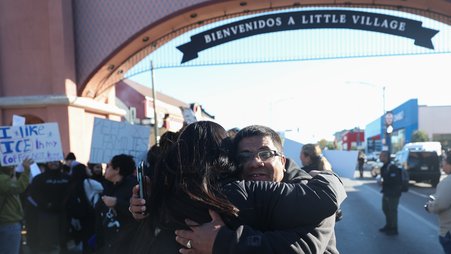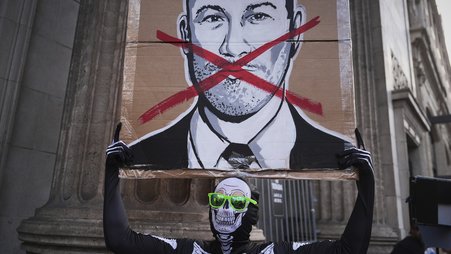Secretary of State Marco Rubio claims the authority to unilaterally declare students who protest the Israel-Gaza war antisemites and terrorism supporters in order to kick them out of the country.
So when even Rubio’s State Department doubts the government has grounds to deport a student — especially an anti-war student from the Middle East — the administration’s position must be exceptionally weak. In the case of Tufts University student Rümeysa Öztürk, it is. The only known “evidence” against her was her co-authoring an op-ed criticizing the war and calling for Tufts to divest from Israeli investments.
According to The Washington Post, the department issued a memo reaching one of the most obvious conclusions in the history of memos – that the Department of Homeland Security’s claim that Öztürk acted “in support of Hamas,” and therefore could be thrown out of the country, is baseless.
Yet the public hasn’t seen that key document about Öztürk, who was abducted by plainclothes federal agents in March and is currently in an immigration jail in Louisiana. The Post’s source was only able to “describe” the memo’s content to journalists.
Nor has the public seen another memo, also reported by the Post, from DHS official Andre Watson to senior State Department official John Armstrong, accusing Öztürk of “anti-Israel activism” with “adverse policy consequences for the United States.” Tellingly, the only example provided by Watson, according to the Post, was the aforementioned op-ed.
These two documents expose the frivolousness of the administration’s case against Öztürk, which is central to one of the most important public debates in America, now and possibly ever. And it’s alarming that whether the government can incarcerate and expel non-citizens (and maybe citizens) who express ideas it doesn’t like qualifies as a “debate” these days.
Federal courts up to the Supreme Court have shot down the administration’s due process-free deportation practices. Some of President Donald Trump’s closest supporters, both in Congress and popular culture, are breaking from his rhetoric on this issue, recognizing the obvious dangers of persecuting nonviolent anti-war speech. Journalists everywhere are self-censoring and pulling stories out of fear of being thrown in jail cells from Louisiana to El Salvador.
A country that expels op-ed writers and hides government records about why simply does not have freedom of the press.
Last week, Federal Communications Commission Chair and shameless Trump lapdog Brendan Carr (the guy wears a golden bust of Trump as a lapel pin) threatened to investigate news outlets that doubt the administration’s false narratives or don’t air all of its spin sessions. Predictably, a Trump-aligned organization filed an FCC complaint echoing Carr’s nonsense.
All that is to say, it’s a big deal that even the State Department knows the administration is wrong. The existence and substance of the two memos have already been reported, so the cat is out of the bag — there is no basis for secrecy. There never was. And there is little risk of tainting a future jury pool — Öztürk can only dream of that kind of due process.
In any event, now that the memos have been disclosed, it’s hard to argue that the public is better off with a potentially incomplete news report than with the entire documents. But this is an administration that believes questioning its infallibility is contrary to the “public interest.”
That’s not how officials who are confident in the accuracy of their facts and the soundness of their legal arguments behave. The administration needs to be prepared to defend its (indefensible) views on free expression, not hide from them. If it claims the First Amendment tolerates throwing people out of the country for using news ink to express political beliefs shared by millions, it needs to be transparent, including about why it overruled internal dissent.
We’ve filed Freedom of Information Act requests for both memos. We know the administration is likely to deny those requests, and we’re prepared to put up a fight there and anywhere else we see an opportunity to force some transparency out of this lawless administration.
As a press freedom organization, there’s no other option. A country that expels op-ed writers and hides government records about why simply does not have freedom of the press.





